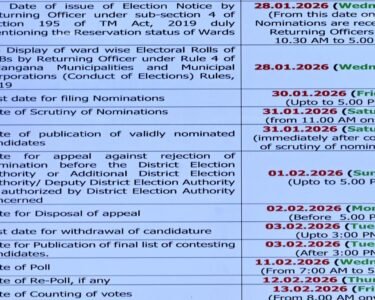In a recent and bold move, the Union Cabinet has approved a policy to procure the entire paddy harvest from farmers. This decision underscores the government’s intent to strengthen farmer welfare, ensure food security, and stabilise agricultural incomes. Simultaneously, the Cabinet has decided to defer the implementation of changes to BC (Backward Classes) reservations until a legal opinion is obtained, in view of constitutional, judicial, and social equity considerations. The dual policy decisions highlight the tension between economic interventions and social justice mandates.
Cabinet’s Decision on Paddy Procurement
Rationale and Objectives
The Cabinet’s decision to procure all paddy produced is driven by multiple goals:
- Safeguarding farmers’ interests: By guaranteeing central procurement, the government aims to protect farmers from distress sales, low prices, or market fluctuations.
- Food security and buffer stocks: Procuring the entire harvest helps the central food grain stocks and ensures that supply chains (for public distribution, rationing, and welfare schemes) are well stocked.
- Price support mechanism: This move acts as a de facto floor price/support price, offering assurance to farmers that their produce will be purchased.
Officials say this procurement will be executed through existing agencies (e.g., Food Corporation / State procurement agencies), mandis and purchase centres, with priority to quality, moisture norms, and logistics.
Operational Challenges
While the ambition is high, several practical issues may arise:
- Storage capacity: Procuring large volumes will demand expansive, secure warehouses, cold storage (where needed), and logistic infrastructure.
- Transportation & logistics: Moving paddy from rural mandis to central stores involves coordination across rail, road, and internal state networks. Delays could lead to spoilage or losses.
- Quality control & moisture norms: Maintaining consistent quality (moisture content, grading) is important to avoid rejection or degradation during storage.
- Funding and fiscal burden: Bulk procurement requires significant capital outlay, payments to farmers, and budgetary provisioning.
- State–Centre coordination: Agriculture is a concurrent/ state subject; success depends on cooperation across central and state governments.
Delaying BC Reservation Changes — Seeking Legal Opinion
Why the Delay?
The Cabinet has chosen not to proceed immediately with proposed changes to backward class (BC) reservation policies. Instead, the government will await a legal opinion to ensure constitutional compliance and avoid potential legal challenges. The decision is likely motivated by:
- Constitutional & judicial scrutiny
Reservations in India are bounded by constitutional limits (e.g. 50% cap — though states have sometimes gone beyond) and by judicial precedents (such as the Indra Sawhney case). Any change in BC percentage or scope is vulnerable to challenge in courts. - Political sensitivity & social equity
Altering BC reservation percentages or beneficiaries can stoke social tensions among communities (forward castes, other backward castes, SC/ST) and rival claims. A cautious, legally vetted approach helps mitigate backlash. - Precedents & pending judgments
Several court cases — in state high courts and the Supreme Court — are under consideration regarding BC reservation limits. The government likely wants to align its policy with emerging jurisprudence rather than pre-empt it. - State-level variation
Since reservation policies often differ by state (depending on demography, backward class categorisation, existing statutes), a uniform change may not be viable everywhere. A legal opinion could help tailor state-wise frameworks.
Implications for Social Justice
- Temporary stall in policy change: Communities demanding more BC reservations may feel sidelined, leading to protests or political pressure.
- Possibility of litigation: If the opinion is adverse, the government may have to abandon or revise planned changes.
- Need for balance: The government must reconcile the mandate of social justice with constitutional boundaries, ensuring fairness to all sections.
Interplay & Political Stakes
These two decisions — procurement policy and caution on BC reservations — reflect a broader balancing act by the government between economic populism and constitutional prudence.
- Electoral politics: Both agriculture and social justice issues are politically sensitive and have a strong electoral appeal. The procurement policy sends a pro-farmer signal, while the reservation decision shows cautious governance.
- Policy sequencing: The government may want to first deliver tangible benefits (through agriculture) and later address socially sensitive reforms after stabilising legal and political groundwork.
- State dynamics: States will also play a crucial role — in procurement operations and in framing reservation laws compatible with central guidelines and court judgements.
Risks & Considerations
- Financial sustainability: Sustained procurement at scale may strain public finances and divert resources from other sectors.
- Market distortions: Guaranteed procurement might discourage private trade, lead to overproduction of paddy, or reduce crop diversification.
- Implementation risk: Delays in executing procurement, or inadequacies in logistics, could hurt farmers, especially in remote or smallholder areas.
- Judicial setback: If the legal opinion or court outcomes reject enlarged BC reservations, political fallout may be significant.
Conclusion
The Cabinet’s twin decisions to commit to procuring the entire paddy harvest and, at the same time, await a legal opinion before acting on BC reservations highlight a complex governance challenge. On one hand, the government is taking a bold economic step to support farmers and ensure food security; on the other, it is proceeding cautiously on the fraught terrain of caste, constitutionality, and social justice. The success of these policies will depend heavily on effective execution, legal clarity, coordination among central and state governments, and carefully calibrated political messaging.
If you like, I can provide a version tailored for your specific state or include recent data/statistics. Do you want me to adjust it accordingly?







